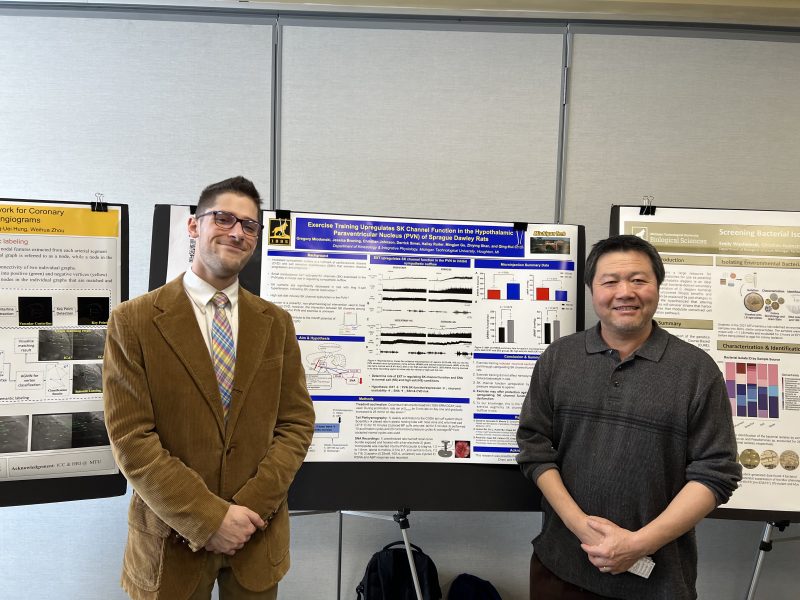PhD student Greg Miodonski was awarded First Place for the poster session at the Health Research Institute’s (HRI) Student Forum on February 24th. Greg, a student in Dr. Qinghui Chen’s (KIP) lab, presented his research project entitled “Exercise Training Upregulates SK Channel Function in the Hypothalamic Paraventricular Nucleus (PVN) of Sprague Dawley Rats.”
PhD candidate Sherry Chen earned Third Place for her research project’s poster presentation entitled “The Role of Peripheral Orexin Systems and Brain-Derived Extracellular Vesicles in Salt Sensitive Hypertension.” Sherry’s advisor is Dr. Zhiying (Jenny) Shan.
“As a graduate student, it is a valuable experience to present my work in the HRI student forum as it facilitates networking with faculty and students outside of my department. During my poster presentation, I had the chance to meet with three judges, including Dr. Caryn Heldt, who is also working on extracellular vesicles. Dr. Heldt asked me questions about the characterizations of nanoparticles in hypertension and showed interest in collaborating in the future. Although our research interests differ – my project focuses on the biological function of the vesicles while Dr. Heldt’s team analyzes their features – we can still explore potential areas of overlap and collaborate based on what we study in common, the vesicles. Thanks for this great opportunity provided by HRI as it provides a platform for networking, exchanging ideas, and potentially new opportunities for research. I am happy to present my work and share new data in HRI next year.” —Sherry Chen on presenting at the HRI Student Forum.
Sherry’s Abstract:
Introduction- It has been reported that small extracellular vesicles (sEVs ≤ 200 nm) are implicated in the pathogenesis of multiple diseases including hypertension. However, the role of brain-derived sEVs in the development of salt sensitive hypertension (SSHTN) remains unclear.
Hypothesis- We hypothesized that brain-derived sEVs from high salt diet-treated rats can induce inflammation and oxidative stress in the central nervous system (CNS). To test this hypothesis, brain-derived sEVs of Dahl salt-sensitive rats with high salt (HS) diet (Dahl-HS-sEV) were used to treat primary brain neuronal cultures and microinjected into brain lateral ventricles, respectively, proinflammatory cytokines, chemokines, and oxidative stress markers were measured through real-time PCR or fluorescent probes. sEVs isolated from Sprague Dawley (SD) rats with normal salt (NS) diet (SD-NS-sEV) were used as a control.
Results– Data showed that Dahl-HS-sEV increased mRNA levels of inflammatory cytokines including TNFα (2.3-fold) and IL1β (3.7-fold), and chemokines including CCL2 (2.4-fold), CCL5 (2.1-fold), and CCL12 (4.2-fold), with significant difference (P<0.05). In addition, Dahl-HS-sEV treatment increased mRNA levels of transcription regulator, NF-κB (1.4-fold), and neuronal activation marker, c-FOS (1.3-fold), as well as CYBA (1.7-fold), in primary neurons, compared to SD-NS-sEV-treated cells (P<0.05). Confocal images showed that Dahl-HS-sEV significantly increased mitochondrial ROS levels, with total fluorescence intensity increased 1.6-fold relative to SD-NS-sEV treatment (P<0.01). SD-NS rats receiving intracerebroventricular injection of Dahl-HS-sEV had increased (P<0.05) PVN mRNA levels of IL1β (4.3-fold), CCL5 (2.6-fold), IL-6 (3.4-fold) and NOS2 (5.2-fold), compared to rats receiving SD-NS-sEV (5.5 μg/rat, n=4), 6h after injection.
Conclusion- These results suggested that in SSHTN, brain-derived sEVs may induce central inflammation and oxidative stress, which in turn results in an elevation of arterial blood pressure.
For the complete list of winners and departments that were represented, please read the Tech Today story that was published on March 7, 2023.

